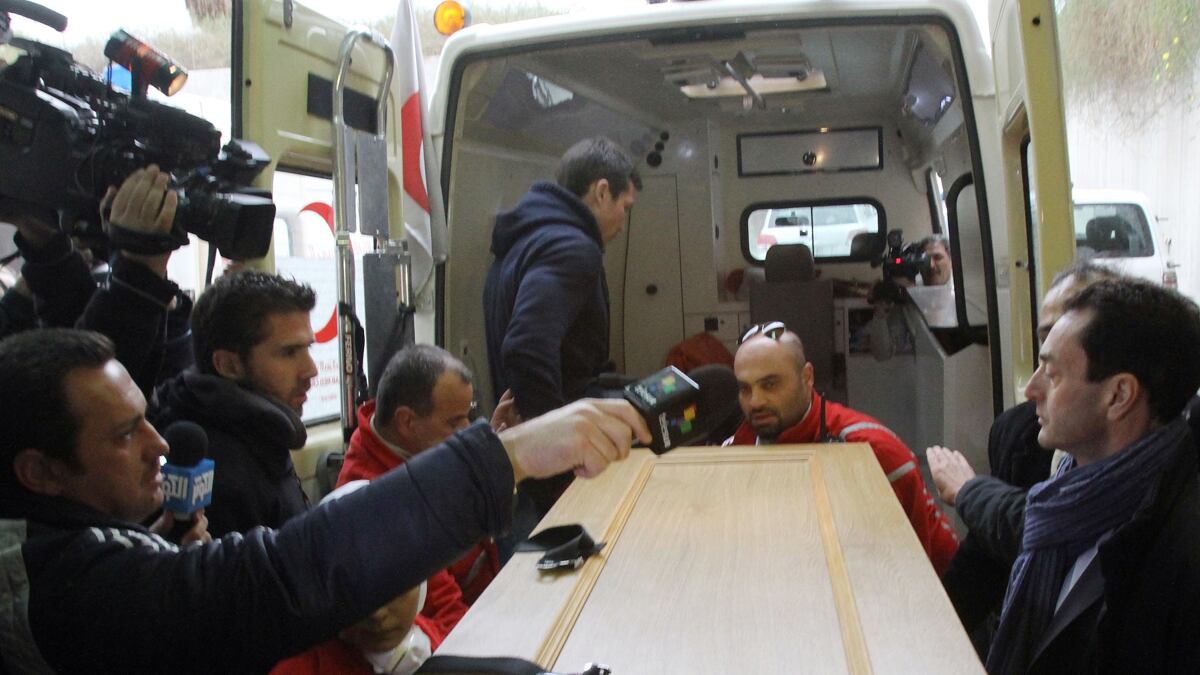It took just seconds for John Cantlie to know that he was in serious trouble. He had made several prior trips into Syria across the Turkish border, to cover the ongoing conflict between rebel forces and the government of Bashar al-Assad. Cantlie had even used the same guide and route before.

On this latest trip in July, he and fellow photojournalist Jeroen Oerlemans were just an hour into their journey when they saw a rebel camp and walked up to it. As they did, Cantlie prepared himself for a warm welcome from the Syrians inside, who were always grateful when members of the international press arrived to document the bloody situation in the country. But when Cantlie and Oerlemans entered the camp, they didn’t find themselves among Syrians at all. Instead, they were surrounded by foreign fighters who had come to the country to wage jihad. The jihadis took away the photographers’ gear, questioned them angrily, and then led them away from the camp at gunpoint.
“You were in the wrong place at the wrong time,” Cantlie remembers some of the fighters telling him as he was held captive over the coming days. The jihadis—who hailed from around the globe, including some from Cantlie’s native Britain—threatened to kill the two journalists, subjected them to mock executions, and sharpened knives in front of them as they promised to cut off their heads.
ADVERTISEMENT
“We were fine [in Syria] three months before—and here we were 12 weeks later, and it was anything but fine,” Cantlie told The Daily Beast from his home in Britain, where he is recuperating from the long and harrowing ordeal. The pair were finally freed after a week of captivity, apparently by Syrian opposition fighters.
Cantlie is a veteran of conflict situations whose work has been featured in the BBC and The Sunday Times, among other publications. He spent much of the last year moving from one war to the next. He’s been embedded with NATO troops in Afghanistan and taken photos from the front lines of the civil war in Libya. But Syria is proving to be a different kind of conflict zone altogether. The murky nature of the fighting is creating considerable danger for journalists in the country, who can have a hard time determining where the danger lies.
Though Afghanistan was also deadly, Cantlie says, covering the conflict there often had the feeling of “war tourism,” with a carefully planned and organized embed system and ubiquitous Western forces. Libya, meanwhile, had an air of predictability once the NATO jets took to the skies—though the quick surges back and forth in the fighting brought its own dangers for journalists, and covering the conflict proved tragically fatal for photojournalists Chris Hondros and Tim Hetherington. “Libya was almost like a movie where the ending was already written,” Cantlie says. “You had the mad-dog colonel in his crazy uniform up against a righteous uprising with NATO jets flying overhead.”
In Syria, though, the makeup of the conflict seems to change by the day. It’s unclear who is winning, and even who is fighting on the different sides. When Cantlie and Oerlemans went missing, reports had just started to emerge that foreign jihadists had joined the fray. “Syria is very different,” Cantlie says. “You have Mukhabarat, the highly feared secret police, and along with that, the shabiha—dumb kids who are paid [by the regime] to do bad things.” Since the beginning of the conflict, the Assad regime has also been accused of targeting journalists.
Even in the rebel-controlled areas, it’s hard to know your allies, as Cantlie learned the hard way. “In Syria, you have fluid battle lines, but you also have a more fluid mix of regular and irregular combatants—a less centralized insurgent force, and also government forces that are being supported in urban areas by militias,” says Frank Smyth, the senior security adviser at the Committee to Protect Journalists.
Smyth points to the dearth of reliable information coming out of the conflict as another factor rendering the situation in Syria dangerously confused—as Cantlie and Oerlemans discovered when they walked into a threatening situation along a route they had once known to be safe. “Not only is it fluid, you also have black holes of information, where there aren’t working journalists or citizen journalists on the ground who are able to report things in a timely manner,” he says. “So it makes it harder for those who are attempting to report to know which way to go.”
Cantlie and Oerlemans were unsure what do in their situation, or even if anyone knew they were gone—as freelancers they operate without the careful support that many large news organizations provide. “The situation was just going from bad to worse,” Cantlie says, recounting how he and Oerlemans were handcuffed to other prisoners the jihadis had accused of being regime spies. “We knew they didn’t plan to release us—that they weren’t just feeding us a line.”
At one point, the pair burst from the camp and fled, scampering barefoot over rocky, cactus-spotted terrain. They didn’t make it far before they were both gunned down—Cantlie in the arm, Oerlemans in the groin. They were then returned to the camp, wounded, until men they took to be part of the rebel Free Syrian Army discovered them and set them free.
Now both men are safe and recuperating. Cantlie, a southpaw, has nerve damage in his left hand, and he expects to face 18 months of rehabilitation, with the possibility that he may never recover full use of his hand. He’s also out about $8,000 in camera equipment, and anxious to get back out in the field, covering conflicts as before. “I need to work,” he says. “This is what I do.”
Cantlie, at the prodding of friends, has agreed to accept donations for a new hardware fund starting next week at http://www.fastfeatures.com/index.html or john.cantlie@gmail.com, and at the prodding of The Daily Beast, has agreed to note that here.





